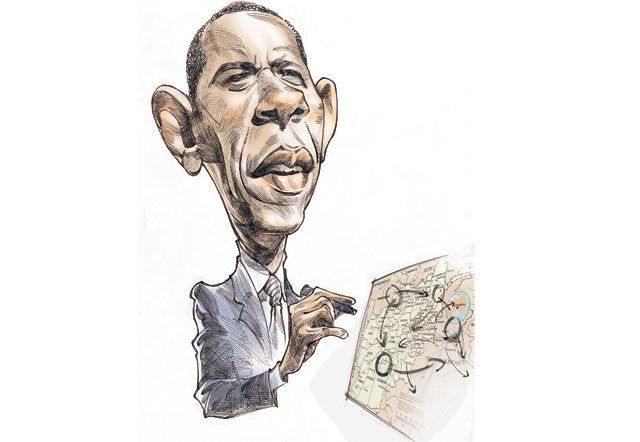US President Barack Obama's new strategy in Afghanistan, which he unveiled last week after many delays, has left supporters and challengers, both at home and abroad, guessing. The only party that seems to have grasped its full meaning and consequences are the Taliban — and not in a manner that would have pleased the White House.
The Taliban were quick to respond to the president's announcement that he was sending an additional 30,000 new troops, 10,000 less than what the generals had requested, beginning as early as January. They vowed to fight on, promising more American deaths. But it was not the surge part of Obama's new strategy that worried American voters, key figures on Capitol Hill, Western allies and nervous leaders in both Kabul and Islamabad. It was the deadline of July 2011, which he said would herald hand-over to Afghan security and the beginning of US troop withdrawal.
This "surge and withdraw" approach, proposed by Obama himself against the wishes of some senior aides, is being viewed by critics as both risky and indecisive. To set a deadline for troop withdrawal, they say, may send the wrong message to the Taliban and Al Qaida, who have been waging a convincingly successful campaign against Nato troops for more than eight years now.
It is argued that the Taliban may use this vital piece of information, a commitment by Obama to his war-weary nation, to devise a counter-strategy that aims at prolonging the confrontation, lying low for a while before building up their own surge as the summer of 2011 approaches.
But the immediate reaction by Nato was favourable, with member nations pledging to send 7,000 more troops to Afghanistan while promising to delay an early pullout. On the other hand, the war has become increasingly unpopular for most Europeans and it is unlikely that leaders there will be able to withstand public pressure to keep troops in Afghanistan for an additional year or more.
The success or failure of the new strategy depends, as Obama has outlined to his war Cabinet, on the speed with which troops can be deployed on the ground to deliver the desired military objectives. But fresh troops will be arriving in Afghanistan in the dead of winter, when most of the rebellious provinces become isolated and unapproachable. It is difficult to see how more American soldiers will be able to make a difference in the first four months of next year.
The Taliban, who now control one-third of the country's 34 provinces, will be biding their time, ensconced in their remote snowy hamlets and waging attacks on high-value targets. This is not new. Nato soldiers who have served in that country for more than one tour of duty know exactly what they are up against. The enemy is almost always invisible, mingling with civilians or safely hidden in inaccessible mountain lairs.
The Pakistan connection to the war in Afghanistan is probably the most worrying to US officials. The recent nexus between Taliban on both sides of the border has given the crisis a new dimension: If Afghanistan falls to the Taliban it will be only a matter of time before Pakistan succumbs to civil and ethnic strife. The reverberations of giving up on Pakistan will be catastrophic, not least because of that country's nuclear arsenal.
Surge
The Obama strategy has one unambiguous objective: To raise the scale of the military option, especially during most of 2010, with the aim of either crushing the Taliban or forcing them into accepting a political settlement. A crucial question then follows: Can Nato forces deliver in one year what they failed to achieve in the past eight years?
This brings us to the second objective in the Obama strategy. By setting a specific deadline for troop redeployment, the US and its allies are hoping to instigate a positive reaction from the government of Hamid Karzai. They hope that he will react by speeding up the training of the country's army so that it will be ready to take over from departing Westerners come July 2011. Washington also hopes that the Pakistani government will take the deadline as a solemn warning, and will in turn focus its efforts on combating its own Taliban rebels before US troop withdrawal is set to begin.
Obama's strategy relies almost entirely on a military conclusion to the impasse in Afghanistan. This is where it is most vulnerable. Eight years of war have delivered nothing more than disappointments, aggravation and acrimony — and that's only describing how the majority of Afghans feel today. Vietnam complex aside, it is fair to say that America and Nato have become enmeshed in the Afghanistan conundrum.
In 2001, America waged war on a government that backed a terrorist group that had attacked New York. Today the war revolves around other issues and no matter what Obama and his generals are attempting to do in Afghanistan, the country is desperate for a political solution, not a military one.
Osama Al Sharif is a veteran journalist and political commentator based in Jordan.










